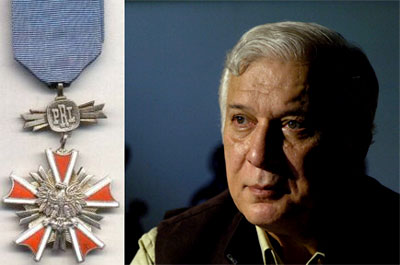به زبان فارسی
PICTORY
LATEST MUSIC
SEARCH
Uncovering a cover up
by Ryszard Antolak
16-Aug-2008
Iranian film director Khosrow Sinai has been awarded the prestigious “Knights Cross of the Order of Merit of the Polish Republic”. At a ceremony earlier this year (June 10th) in the Polish capital, the country’s president Lech Kaczynski bestowed the honour on the Iranian filmmaker in recognition of his services to the Polish Nation, and in particular for his documentary “The Lost Requiem”, made in 1982.
Also honoured were five Iranian citizens of Polish descent, survivors of the “Polish Exodus” living in Iran. They are: Fatemeh Fazelishahir, Maria Bajdan, Fatemeh Wandeh Vashi, Eleonora Barska and Helena Stelmach. Each was awarded the Siberian Cross.
The Lost Requiem tells the story of the war-time arrival in Iran of hundreds of thousands of Poles released from Soviet labour camps of Siberia. During the two months of April and August 1942, ships crammed with emaciated men, women and children arrived daily at the Caspian port of Anzali. Their condition was desperate.
Within weeks of their arrival, thousands had died from malnutrition, malaria and typhus. The healthy young men were evacuated immediately to Syria and Lebanon to aid the allied forces against Hitler. The rest (mostly women and children) remained in Iranian refugee camps for up to three years before being evacuated to camps in East Africa, New Zealand and India.
But a significant proportion decided to stay in Iran for good, and their stories are recounted in Sinai’s documentary “The Lost Requiem”.
Such a ceremony in the Polish capital would have been unthinkable just twenty years ago. Until as recently as 1989, it was forbidden to refer to the Polish Exodus in the Russian-dominated Polish media. In the West, things were scarcely better.
The British and US governments, who had secretly betrayed their ally Poland to the Soviets at the Tehran Conference in 1943, continued to collude together for almost 50 years to cover up (or obfuscate) knowledge of the events. Almost alone among international filmmakers, Sinai laboured to bring the matter to the public domain.
It was an uphill struggle, however. Even today, the film is not on general release and is available only on DVDs distributed privately.
The medal of the Order of Merit is a five-armed red and white cross emblazoned with a Polish eagle and suspended from a dark blue ribbon.
| Recently by Ryszard Antolak | Comments | Date |
|---|---|---|
| Echoes of Polish Isfahan | 9 | Apr 15, 2012 |
| Forgotten Poet | 6 | Oct 17, 2010 |
| Journey to Alamut | 11 | Mar 15, 2010 |
RECENT COMMENTS
IRANIANS OF THE DAY
| Person | About | Day |
|---|---|---|
| نسرین ستوده: زندانی روز | Dec 04 | |
| Saeed Malekpour: Prisoner of the day | Lawyer says death sentence suspended | Dec 03 |
| Majid Tavakoli: Prisoner of the day | Iterview with mother | Dec 02 |
| احسان نراقی: جامعه شناس و نویسنده ۱۳۰۵-۱۳۹۱ | Dec 02 | |
| Nasrin Sotoudeh: Prisoner of the day | 46 days on hunger strike | Dec 01 |
| Nasrin Sotoudeh: Graffiti | In Barcelona | Nov 30 |
| گوهر عشقی: مادر ستار بهشتی | Nov 30 | |
| Abdollah Momeni: Prisoner of the day | Activist denied leave and family visits for 1.5 years | Nov 30 |
| محمد کلالی: یکی از حمله کنندگان به سفارت ایران در برلین | Nov 29 | |
| Habibollah Golparipour: Prisoner of the day | Kurdish Activist on Death Row | Nov 28 |




Thank you for this
by MH (not verified) on Mon Aug 18, 2008 06:13 AM PDTThank you for this informative article.
Dziękuję
by ahvazi on Sat Aug 16, 2008 03:26 PM PDTThank you for the article.
WONDERFUL
by Darius Kadivar on Sat Aug 16, 2008 02:34 PM PDTWow Ryszard This is Such a great thing. I admire Khosrow Sinai's work and efforts to keep this part of our history alive and show what is scanadolously overlooked by todays leadership in Iran and that is the reality of the Holocaust and the generosity of Iranians during WWII towards the Jewish refugees who came from Poland and Russia to Iran. The famous story of the "Children of Tehran" is a further proof of the great ties between Iranians and the Polish people in general.
Bravo Mr. Sinai.
VIVE LA POLOGNE, VIVE L'IRAN ET VIVE LE CINEMA !